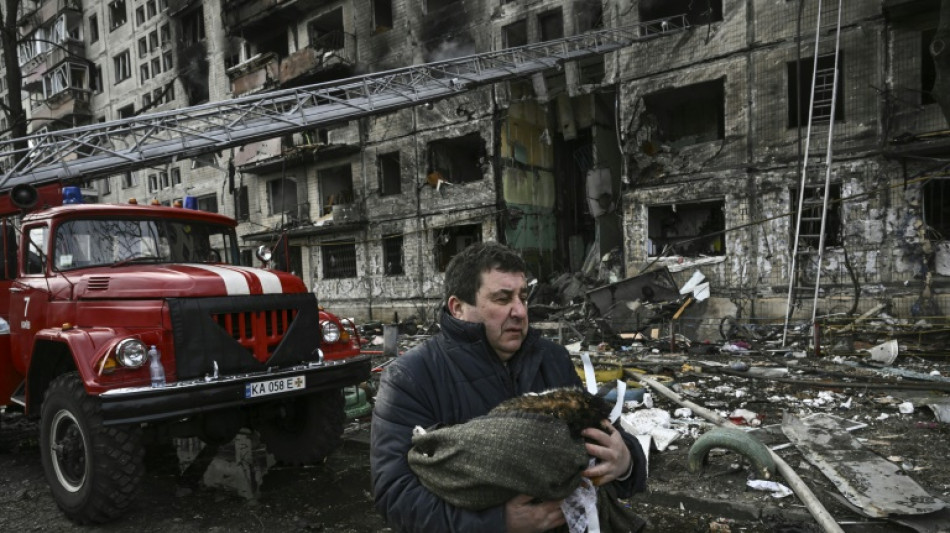
-
 Heart attack ends iconic French prop Atonio's career
Heart attack ends iconic French prop Atonio's career
-
SKorean chip giant SK hynix posts record operating profit for 2025

-
 Greenland's elite dogsled unit patrols desolate, icy Arctic
Greenland's elite dogsled unit patrols desolate, icy Arctic
-
Dutch tech giant ASML posts bumper profits, cuts jobs

-
 Musetti rues 'really painful' retirement after schooling Djokovic
Musetti rues 'really painful' retirement after schooling Djokovic
-
Russian volcano puts on display in latest eruption

-
 Thailand uses contraceptive vaccine to limit wild elephant births
Thailand uses contraceptive vaccine to limit wild elephant births
-
Djokovic gets lucky to join Pegula, Rybakina in Melbourne semi-finals

-
 Trump says to 'de-escalate' Minneapolis, as aide questions agents' 'protocol'
Trump says to 'de-escalate' Minneapolis, as aide questions agents' 'protocol'
-
'Extremely lucky' Djokovic into Melbourne semi-finals as Musetti retires

-
 'Animals in a zoo': Players back Gauff call for more privacy
'Animals in a zoo': Players back Gauff call for more privacy
-
Starmer heads to China to defend 'pragmatic' partnership

-
 Uganda's Quidditch players with global dreams
Uganda's Quidditch players with global dreams
-
'Hard to survive': Kyiv's elderly shiver after Russian attacks on power and heat

-
 South Korea's ex-first lady jailed for 20 months for taking bribes
South Korea's ex-first lady jailed for 20 months for taking bribes
-
Polish migrants return home to a changed country

-
 Dutch tech giant ASML posts bumper profits, eyes bright AI future
Dutch tech giant ASML posts bumper profits, eyes bright AI future
-
South Korea's ex-first lady jailed for 20 months for corruption

-
 Minnesota congresswoman unbowed after attacked with liquid
Minnesota congresswoman unbowed after attacked with liquid
-
Backlash as Australia kills dingoes after backpacker death

-
 Brazil declares acai a national fruit to ward off 'biopiracy'
Brazil declares acai a national fruit to ward off 'biopiracy'
-
Anisimova 'loses her mind' after Melbourne quarter-final exit

-
 Home hope Goggia on medal mission at Milan-Cortina Winter Olympics
Home hope Goggia on medal mission at Milan-Cortina Winter Olympics
-
Omar attacked in Minneapolis after Trump vows to 'de-escalate'

-
 Pistons escape Nuggets rally, Thunder roll Pelicans
Pistons escape Nuggets rally, Thunder roll Pelicans
-
Dominant Pegula sets up Australian Open semi-final against Rybakina

-
 'Animals in a zoo': Swiatek backs Gauff call for more privacy
'Animals in a zoo': Swiatek backs Gauff call for more privacy
-
Japan PM's tax giveaway roils markets and worries voters

-
 Amid Ukraine war fallout, fearful Chechen women seek escape route
Amid Ukraine war fallout, fearful Chechen women seek escape route
-
Rybakina surges into Melbourne semis as Djokovic takes centre stage

-
 Dollar struggles to recover from losses after Trump comments
Dollar struggles to recover from losses after Trump comments
-
Greenland blues to Delhi red carpet: EU finds solace in India

-
 Will the EU ban social media for children in 2026?
Will the EU ban social media for children in 2026?
-
Netherlands faces 'test case' climate verdict over Caribbean island

-
 Rybakina stuns Swiatek to reach Australian Open semi-finals
Rybakina stuns Swiatek to reach Australian Open semi-finals
-
US ouster of Maduro nightmare scenario for Kim: N. Korean ex-diplomat

-
 Svitolina credits mental health break for reaching Melbourne semis
Svitolina credits mental health break for reaching Melbourne semis
-
Japan's Olympic ice icons inspire new skating generation

-
 Safe nowhere: massacre at Mexico football field sows despair
Safe nowhere: massacre at Mexico football field sows despair
-
North Korea to soon unveil 'next-stage' nuclear plans, Kim says

-
 French ex-senator found guilty of drugging lawmaker
French ex-senator found guilty of drugging lawmaker
-
US Fed set to pause rate cuts as it defies Trump pressure

-
 Sleeping with one eye open: Venezuelans reel from US strikes
Sleeping with one eye open: Venezuelans reel from US strikes
-
Venezuela's acting president says US unfreezing sanctioned funds

-
 KPop Demon Hunters star to open Women's Asian Cup
KPop Demon Hunters star to open Women's Asian Cup
-
Trump warns of 'bad things' if Republicans lose midterms

-
 Russian strikes in Ukraine kill 12, target passenger train
Russian strikes in Ukraine kill 12, target passenger train
-
With Maduro gone, Venezuelan opposition figure gets back to work

-
 Celebrities call for action against US immigration raids
Celebrities call for action against US immigration raids
-
Rubio to warn Venezuela leader of Maduro's fate if defiant


Last apps standing?: Telegram, WhatsApp duck Russia bans
Chat platforms like WhatsApp and Telegram have avoided being blocked by Russia -- unlike some of the world's biggest social networks -- in a tenuous tolerance that experts warn could end suddenly.
Years of tension between Moscow and US-based Facebook and Twitter erupted into confrontation after the invasion of Ukraine, with the platforms targeting state-tied media and then finding themselves restricted in Russia.
YouTube, which has barred channels linked to Russian state media globally, was on Friday also facing a direct threat of being blocked after Russia's media regulator, Roskomnadzor, accused the site's owner Google of being "anti-Russian."
Messaging apps, however, have gotten a pass so far in part because Meta-owned WhatsApp is less suited for mass communication, while Telegram's ability to blast information to large groups has made it useful both for independent media and the Kremlin.
"I think it's unlikely Russia will ban Telegram because they are so short on platforms where they can operate," said Sergey Sanovich, a postdoctoral researcher at Princeton University, who noted that authorities in 2020 aborted efforts to block the service.
Telegram, criticized as having a lax content policing policy, offers a forum for Russian authorities to promote narratives friendly to their internationally condemned war.
Russia still operates accounts on platforms like Facebook, despite blocking the service at home, but this week the Silicon Valley giant took down posts from Moscow's pages that contained misinformation about its deadly offensive.
Telegram has become an essential exchange for news on the war, with its growth accelerating after the Kremlin's latest crackdown on independent media and the lock-out of apps like Facebook and Instagram.
An average of 2.5 million new users joined Telegram daily in the last three weeks, the firm said, about a 25 percent jump from the weeks prior.
- 'Declaring war on YouTube' -
But experts highlighted a risk to Telegram and its users due to a lack of default, end-to-end encryption that potentially leaves the company susceptible to government pressure to turn over information.
Alp Toker, director of web monitoring group NetBlocks, noted WhatsApp has put in place firestops that offer insulation against that sort of pressure.
"By improving their security and adopting end-to-end encryption technology, they have essentially protected their own platform from legal risk and potential demands for content access requests," Toker added.
WhatsApp's use for one-on-one or group chats make it less of a target for Russian authorities for now, but that could change if it became known as a key platform for protests against the war.
"Primarily, Roskomnadzor has been very concerned about channels and news and ways of disseminating information to large numbers of people, which WhatsApp and such are less good for," said Eva Galperin, director of cybersecurity at Electronic Frontier Foundation.
But Toker noted that the question hasn't reached a critical point yet for authorities, partly because it was social media platforms, many of them now blocked, that had played a key role in organizing.
"As those (platforms) disappear, the dynamics could change and messaging apps could become the next target," he added.
WhatsApp was one of the most popular apps in Russia in 2021, with some 67 million users or about 65 percent of internet users in the country -- far ahead of TikTok, Russian social media platform VK, and even Telegram, according to data from eMarketer.
But YouTube, with 76 million viewers in 2021, drew more Russians than any of the above platforms, the data showed.
Its popularity was due in part to the access it offers to entertainment for everyday Russians, who in turn provided an audience for politicians and the government seeking their attention.
Sanovich, the Princeton researcher, said the platform had simply gotten on the wrong side of authorities.
"They have a hard time controlling YouTube in terms of censorship and YouTube's recent moves made it less valuable as a venue for foreign propaganda," he noted.
The lack of a sufficiently high-quality homegrown alternative has also been a complicating factor for the government in deciding what to do with YouTube.
Toker, the NetBlocks director, cautioned that the blocking of YouTube would mean confronting Google, with its suite of services like Gmail.
"Declaring war on YouTube effectively means declaring war on the rest of the company," he noted. "Google is a major force in business and a significant connection to the outside world."
W.Lapointe--BTB




